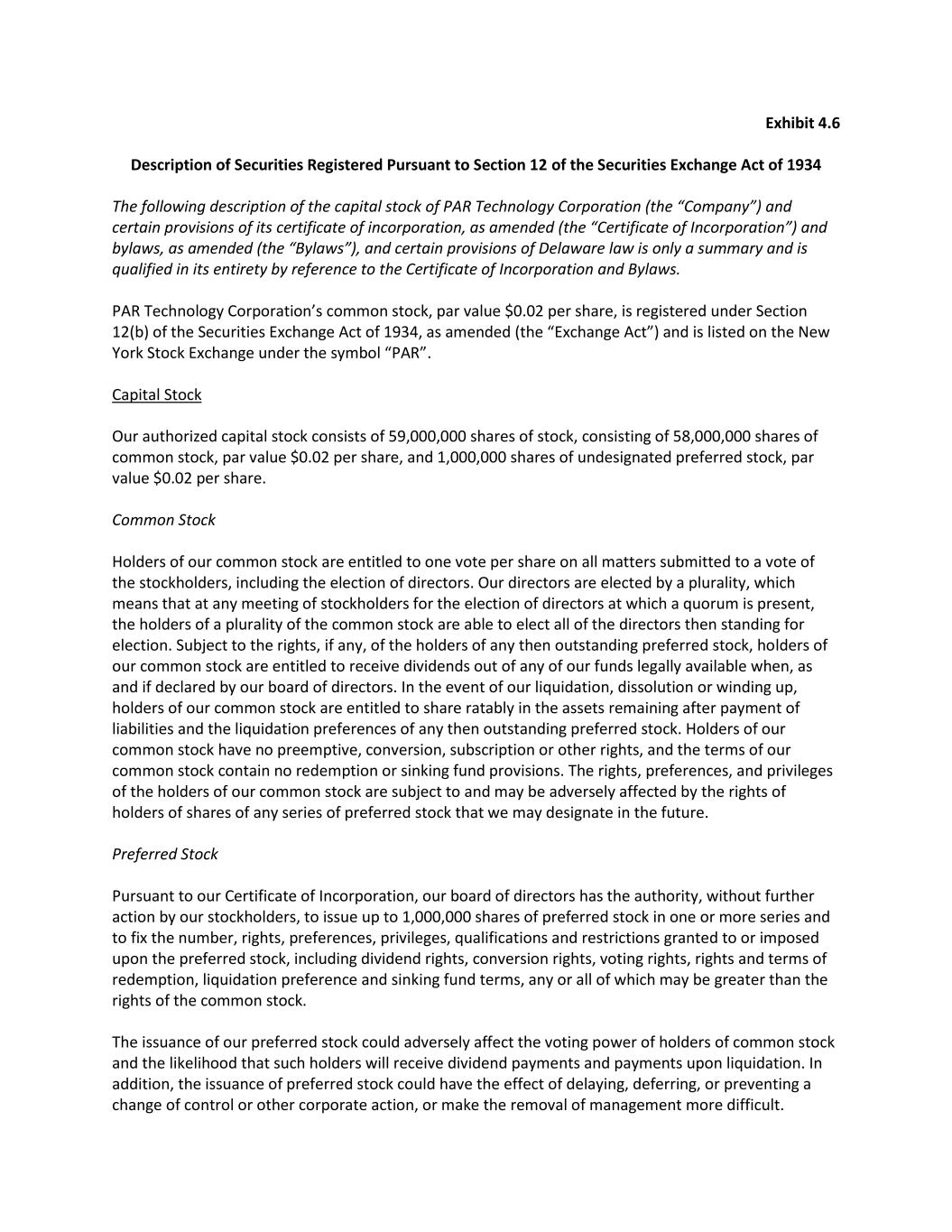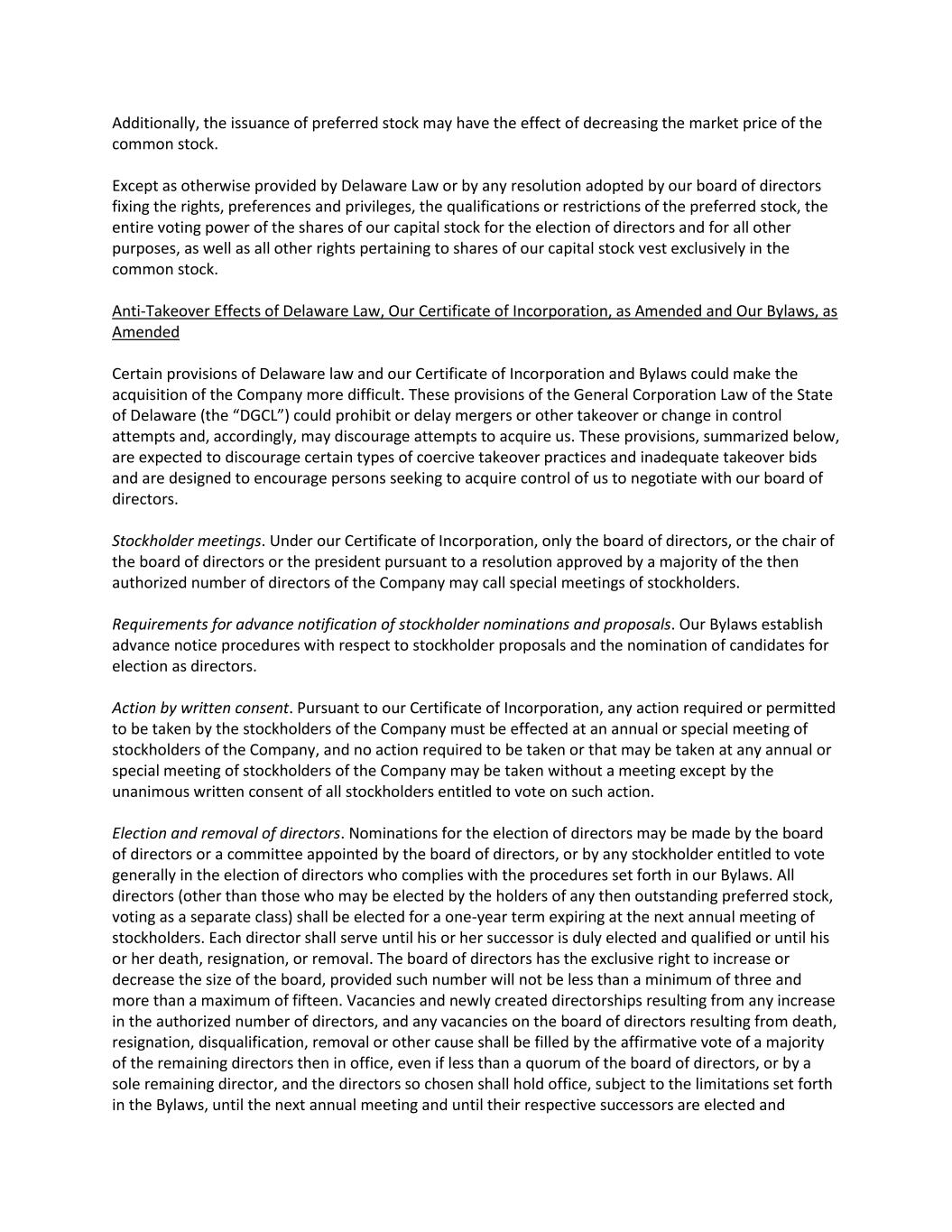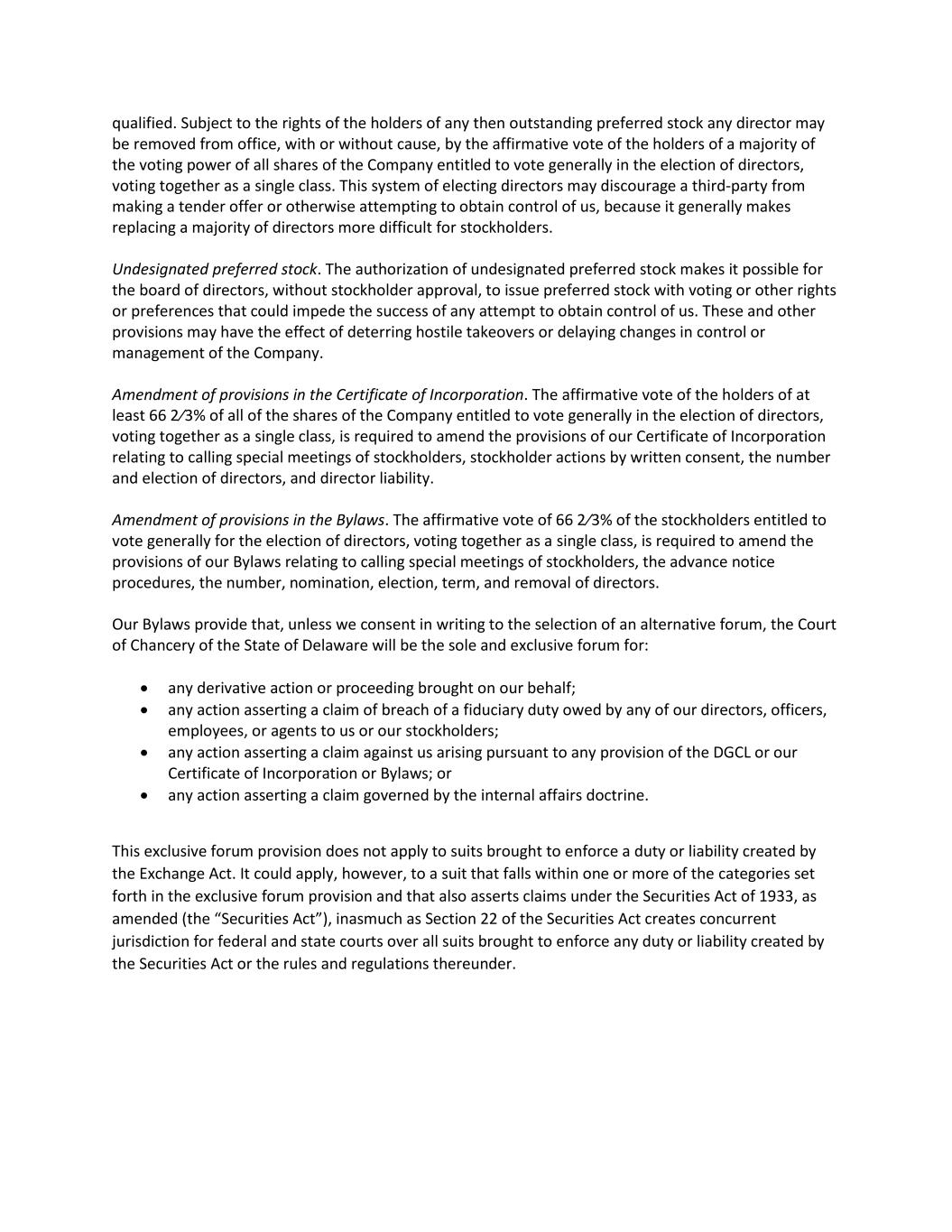
Exhibit 4.6 Description of Securities Registered Pursuant to Section 12 of the Securities Exchange Act of 1934 The following description of the capital stock of PAR Technology Corporation (the “Company”) and certain provisions of its certificate of incorporation, as amended (the “Certificate of Incorporation”) and bylaws, as amended (the “Bylaws”), and certain provisions of Delaware law is only a summary and is qualified in its entirety by reference to the Certificate of Incorporation and Bylaws. PAR Technology Corporation’s common stock, par value $0.02 per share, is registered under Section 12(b) of the Securities Exchange Act of 1934, as amended (the “Exchange Act”) and is listed on the New York Stock Exchange under the symbol “PAR”. Capital Stock Our authorized capital stock consists of 59,000,000 shares of stock, consisting of 58,000,000 shares of common stock, par value $0.02 per share, and 1,000,000 shares of undesignated preferred stock, par value $0.02 per share. Common Stock Holders of our common stock are entitled to one vote per share on all matters submitted to a vote of the stockholders, including the election of directors. Our directors are elected by a plurality, which means that at any meeting of stockholders for the election of directors at which a quorum is present, the holders of a plurality of the common stock are able to elect all of the directors then standing for election. Subject to the rights, if any, of the holders of any then outstanding preferred stock, holders of our common stock are entitled to receive dividends out of any of our funds legally available when, as and if declared by our board of directors. In the event of our liquidation, dissolution or winding up, holders of our common stock are entitled to share ratably in the assets remaining after payment of liabilities and the liquidation preferences of any then outstanding preferred stock. Holders of our common stock have no preemptive, conversion, subscription or other rights, and the terms of our common stock contain no redemption or sinking fund provisions. The rights, preferences, and privileges of the holders of our common stock are subject to and may be adversely affected by the rights of holders of shares of any series of preferred stock that we may designate in the future. Preferred Stock Pursuant to our Certificate of Incorporation, our board of directors has the authority, without further action by our stockholders, to issue up to 1,000,000 shares of preferred stock in one or more series and to fix the number, rights, preferences, privileges, qualifications and restrictions granted to or imposed upon the preferred stock, including dividend rights, conversion rights, voting rights, rights and terms of redemption, liquidation preference and sinking fund terms, any or all of which may be greater than the rights of the common stock. The issuance of our preferred stock could adversely affect the voting power of holders of common stock and the likelihood that such holders will receive dividend payments and payments upon liquidation. In addition, the issuance of preferred stock could have the effect of delaying, deferring, or preventing a change of control or other corporate action, or make the removal of management more difficult.

Additionally, the issuance of preferred stock may have the effect of decreasing the market price of the common stock. Except as otherwise provided by Delaware Law or by any resolution adopted by our board of directors fixing the rights, preferences and privileges, the qualifications or restrictions of the preferred stock, the entire voting power of the shares of our capital stock for the election of directors and for all other purposes, as well as all other rights pertaining to shares of our capital stock vest exclusively in the common stock. Anti-Takeover Effects of Delaware Law, Our Certificate of Incorporation, as Amended and Our Bylaws, as Amended Certain provisions of Delaware law and our Certificate of Incorporation and Bylaws could make the acquisition of the Company more difficult. These provisions of the General Corporation Law of the State of Delaware (the “DGCL”) could prohibit or delay mergers or other takeover or change in control attempts and, accordingly, may discourage attempts to acquire us. These provisions, summarized below, are expected to discourage certain types of coercive takeover practices and inadequate takeover bids and are designed to encourage persons seeking to acquire control of us to negotiate with our board of directors. Stockholder meetings. Under our Certificate of Incorporation, only the board of directors, or the chair of the board of directors or the president pursuant to a resolution approved by a majority of the then authorized number of directors of the Company may call special meetings of stockholders. Requirements for advance notification of stockholder nominations and proposals. Our Bylaws establish advance notice procedures with respect to stockholder proposals and the nomination of candidates for election as directors. Action by written consent. Pursuant to our Certificate of Incorporation, any action required or permitted to be taken by the stockholders of the Company must be effected at an annual or special meeting of stockholders of the Company, and no action required to be taken or that may be taken at any annual or special meeting of stockholders of the Company may be taken without a meeting except by the unanimous written consent of all stockholders entitled to vote on such action. Election and removal of directors. Nominations for the election of directors may be made by the board of directors or a committee appointed by the board of directors, or by any stockholder entitled to vote generally in the election of directors who complies with the procedures set forth in our Bylaws. All directors (other than those who may be elected by the holders of any then outstanding preferred stock, voting as a separate class) shall be elected for a one-year term expiring at the next annual meeting of stockholders. Each director shall serve until his or her successor is duly elected and qualified or until his or her death, resignation, or removal. The board of directors has the exclusive right to increase or decrease the size of the board, provided such number will not be less than a minimum of three and more than a maximum of fifteen. Vacancies and newly created directorships resulting from any increase in the authorized number of directors, and any vacancies on the board of directors resulting from death, resignation, disqualification, removal or other cause shall be filled by the affirmative vote of a majority of the remaining directors then in office, even if less than a quorum of the board of directors, or by a sole remaining director, and the directors so chosen shall hold office, subject to the limitations set forth in the Bylaws, until the next annual meeting and until their respective successors are elected and

qualified. Subject to the rights of the holders of any then outstanding preferred stock any director may be removed from office, with or without cause, by the affirmative vote of the holders of a majority of the voting power of all shares of the Company entitled to vote generally in the election of directors, voting together as a single class. This system of electing directors may discourage a third-party from making a tender offer or otherwise attempting to obtain control of us, because it generally makes replacing a majority of directors more difficult for stockholders. Undesignated preferred stock. The authorization of undesignated preferred stock makes it possible for the board of directors, without stockholder approval, to issue preferred stock with voting or other rights or preferences that could impede the success of any attempt to obtain control of us. These and other provisions may have the effect of deterring hostile takeovers or delaying changes in control or management of the Company. Amendment of provisions in the Certificate of Incorporation. The affirmative vote of the holders of at least 66 2∕3% of all of the shares of the Company entitled to vote generally in the election of directors, voting together as a single class, is required to amend the provisions of our Certificate of Incorporation relating to calling special meetings of stockholders, stockholder actions by written consent, the number and election of directors, and director liability. Amendment of provisions in the Bylaws. The affirmative vote of 66 2∕3% of the stockholders entitled to vote generally for the election of directors, voting together as a single class, is required to amend the provisions of our Bylaws relating to calling special meetings of stockholders, the advance notice procedures, the number, nomination, election, term, and removal of directors. Our Bylaws provide that, unless we consent in writing to the selection of an alternative forum, the Court of Chancery of the State of Delaware will be the sole and exclusive forum for: • any derivative action or proceeding brought on our behalf; • any action asserting a claim of breach of a fiduciary duty owed by any of our directors, officers, employees, or agents to us or our stockholders; • any action asserting a claim against us arising pursuant to any provision of the DGCL or our Certificate of Incorporation or Bylaws; or • any action asserting a claim governed by the internal affairs doctrine. This exclusive forum provision does not apply to suits brought to enforce a duty or liability created by the Exchange Act. It could apply, however, to a suit that falls within one or more of the categories set forth in the exclusive forum provision and that also asserts claims under the Securities Act of 1933, as amended (the “Securities Act”), inasmuch as Section 22 of the Securities Act creates concurrent jurisdiction for federal and state courts over all suits brought to enforce any duty or liability created by the Securities Act or the rules and regulations thereunder.


